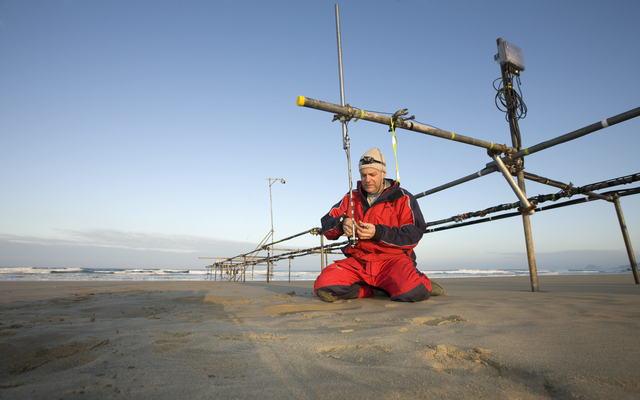
From his earliest memories watching the underwater world through his mask and snorkel, UNSW Engineering alumni Professor Ian Turner says his fascination with the coast is undiminished.
Today, as the Director of UNSW’s world-famous Water Research Laboratory (WRL) located at the University’s Northern Beaches Campus in Manly Vale, Turner says his focus is on both tackling the most pressing coastal challenges facing the country and addressing the lack of equity and diversity in engineering and other STEMM disciplines.

Where did your career take you after graduating from your UNSW Master of Environmental Engineering Science in 1995?
I went straight to the U.S. to do postdoctoral research at the University of Maryland for two years, after which I returned to Australia to work for 10 years in the consulting space. Then, after being awarded a Churchill Fellowship and spending an incredible three months visiting some of the top coastal engineering research groups in Europe and the U.S., I felt a renewed pull towards academia and decided to see if I could transition back.
UNSW was then, and still is, the standout university in Australia for coastal engineering so I was lucky when an opportunity opened in 2007 within the School of Civil and Environmental Engineering. I’ve been at UNSW ever since. My job at WRL is deeply satisfying and I believe I have the best position in my field in Australia, and one of the best in the world.
Why did you gravitate towards coastal engineering?
This dates back to my being really young, under five years old, spending summer days at the beach on Cape Cod in Massachusetts. For the first part of my life living in England, my father - who is also an academic - worked each summer in the U.S., which meant that every year the entire family moved back and forth across the Atlantic from our home in Cambridge.
Australia is a uniquely coastal-focused nation. The coastline is where we live and where we trade, but it’s also part of our identity. Managing the coastline into the future is one of the important challenges for us to get right, which makes it a really interesting place to focus my energies.
WRL continues to go from strength to strength. What do you think are some of the secrets to your success?
Because it is such a dynamic and complex environment, coastal engineering is multidisciplinary by its very nature. As technical engineers, I think the key to our success has been to embrace this complexity. We spend a lot of time building great relationships with our partners and understand the (sometimes conflicting) needs of all three levels of government, industry, the environment and the community.
We also consciously focus our energy on projects that will have the biggest impact in terms of education and improving the ways we manage and protect our coastline. This is an explicit decision the team makes before launching into any new project.
Can you give a couple of career highlights?
One was leading an initiative to develop a teachers’ guide providing a coastal management perspective to STEMM education [Science, Technology, Engineering, Mathematics and Medicine] in high schools in the Australian curriculum. This guide is now being used as an educational tool right across the country, which is very satisfying.
Another was in 2016, when a large storm impacted the south east coast of Australia. I found myself thrust into the national and international spotlight, interpreting the impacts of that storm and why it occurred. I even led the BBC World News!
But I think the most important highlight has been the opportunity I’ve been afforded throughout my time at UNSW to create a career where my professional life and family commitments are highly compatible. Echoing the special childhood experiences I had while growing up in Europe, the U.S. and Australia, during the past decade my own growing family have had the opportunity to create and experience a ‘second life’ living, working and going to school in Cornwall (southwest England); as they have accompanied me during three extended and professionally productive sabbaticals.
Finding it hard to achieve professional/personal life balance is a barrier to more women reaching senior positions in academia, so it’s great you’ve mentioned your interest in it. What are your thoughts on this?
This is on my mind a lot at the moment because I recently joined the UNSW Athena SWAN Gender Equity team. Athena SWAN is a whole-of-university initiative to increase diversity and gender equity in STEMM subjects and we are in the process of implementing a four-year gender equity action plan.
I’m well aware that I’m a white hetero male in a leadership role with a happy marriage, two kids, a dog and a nice house, but because I grew up in a feminist household, I’m really keen to contribute to the gender equity conversation. I’m learning that it is easy to provide better opportunities for women, but it does require leaders like me to recognise when unconscious bias kicks in.
One of my reasons for being involved in the Athena SWAN space is to open the door for other male leaders to do so as well. I have a 14-year-old daughter, and it’s very important to me that I am part of creating an equal future for her to progress through.
//